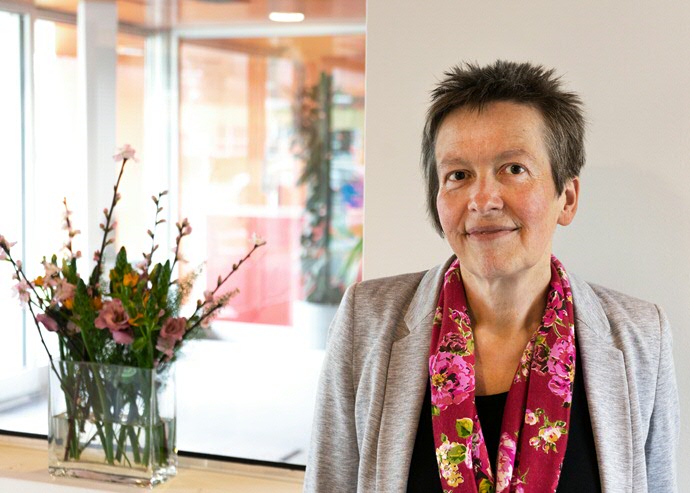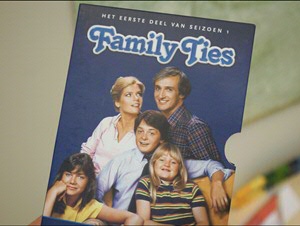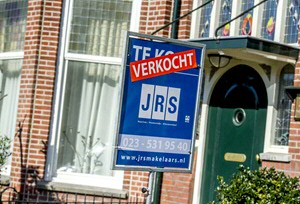Home is where the family lives

Eight years ago, ‘Professor of Moving’ Clara Mulder followed her heart and moved from Amsterdam to Groningen. A typical case of scientific theory being put into practice. ‘I research subjects that affect everyone at some point in their life: relationships, family, splitting up, moving, family formation.’ A frank discussion about the remarkable way her work is intertwined with her life, in which Mulder also debunks a popular myth.
Text: Riepko Buikema, photographs: Merel Weijer
‘Look’, says Clara Mulder halfway through the interview, showing me the cover of a DVD of the American comedy series Family Ties. ‘Do you know this series? I used to watch it in the 1980s. It was Michael J. Fox’s breakthrough. I’d forgotten what the series was called until a colleague pointed it out, and then two PhD students gave me the DVD as a gift. I watched every episode at home, and it made me feel very nostalgic.’
Own life as a source of inspiration
The gift was a reference to Mulder’s large-scale European research into the influence of family ties on moves within the same country, which just happens to have the same name as the series. Another amusing similarity between Family Ties and her career: the final episode of the series - Alex Doesn’t Live Here Anymore - is about a forthcoming move to New York. ‘Leaving the parental home, buying your first home. I was actually studying subjects that I had experienced, or would in future experience, myself. It’s great to be able to link your research to your own life and draw inspiration from it.’

Informal care
The Professor of Demography and Space was born in 1962 and is now at an age when many of her friends, colleagues and acquaintances talk about moves connected with caring for elderly parents. ‘We persuaded our mother to come and live closer to us, they say. Or today I spoke to an Italian colleague who may have to return to Italy if her parents become ill or less able to cope.’
Moving of your own volition
Fascinating conversations, says Mulder. Anecdotes crying out for an academic analysis based on much larger numbers because, as Mulder has repeatedly proved, family ties play a major role in where we choose to live. ‘The pattern I’ve seen up until now is that people move because it’s better for them. They move closer to their parents if they themselves divorce or have children. This is often so that they can count on help from their parents or because it's nice to have Granny and Granddad living nearby. We still have to look into whether this effect is also prompted by the care needs of ageing parents.’
Myth
The truth: Contrary to what is often claimed, the Dutch are actually moving less than before. ‘I keep reading that people are moving more. It simply isn’t true. We need to rid the world of this myth!’, laughs Mulder. ‘New technology means that we work at home more often. You don’t always need to move for your work these days. In addition, more people own their own homes and home-owners are less inclined to move house. And then there’s the ever-growing two-incomes effect. A partner who also has a job is less likely to want to move.’

Amsterdam
Mulder takes a sip of tea. The mug features fading pictures of colleagues from her time in Amsterdam. Until 2011, she had spent almost her entire life in the capital. ‘I would never even have contemplated moving to Groningen if I hadn’t met my new partner. He was keen to move back here to be closer to his children.’
Two minds
Mulder was in two minds about the move. Family ties (what else?) initially made a move to Groningen difficult for her. ‘At the time, my father needed a lot of care. I thought: can I really move away from my father with a clear conscience? I shared this concern with my six brothers and sisters, three of whom lived in Amsterdam. We had (and still have) a good relationship, largely because we talked so much about helping my father. I told them about my plans to move away from Amsterdam while we were visiting my mother’s grave one day. It wasn’t easy.’
Formative city
Mulder has huge wall paintings hanging in her office in the Mercator Building to remind her of the city that played such a large part in her life. They include a historical map of Amsterdam in the late nineteenth century and an aerial photo of the city centre in 2000. ‘I'm slowly getting over it’, says Mulder with a smile. ‘But this lets me show people exactly where I used to live, on Rapenburgerstraat close to Waterlooplein. To be honest, I still feel homesick every now and then. I’ll always be an Amsterdammer at heart.’
For more information
- Contact: Clara Mulder, Professor of Demography and Space
- About the research project FamilyTies
More news
-
01 December 2025
The power of movement
